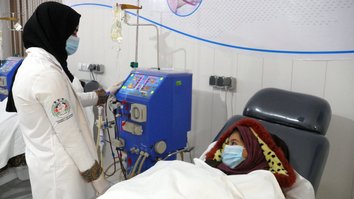KABUL -- A charity that provides free health services in Afghanistan says that its patient load has almost doubled from growing economic problems in the country.
Doctors in Kabul established Daricha Sehat (Window of Health) in 2017 to give free treatment to patients who cannot afford to pay for medical services.
The charity has established two clinics in Kabul and deploys mobile teams to visit poor neighbourhoods, internally displaced persons (IDPs) in various locations, and Bamiyan and Maidan Wardak provinces every month to provide medical services to impoverished patients.
The number of impoverished patients in the country has increased lately, said Dr. Shoaib Shaban, director of Daricha Sehat.
"With the deteriorating economic situation where most [Afghans] cannot find food, the number of poor patients and visitors has certainly increased manifold," he said.
"For example, we used to see 30-40 patients per day, but now it has gone up to 50-80 patients per day in different departments."
The cost of treatment for these patients -- including tests and medicine -- is paid by members of the charity and philanthropists, according to Shaban.
The organisation was created to provide free medical and specialised services to impoverished patients and those who lack access, Shaban said.
Daricha Sehat also raises awareness on the prevention of various diseases in underprivileged and remote areas of the country, he added.
"More than 40 medical doctors are members of this team ... including general physicians, gynaecologists, pediatrics, ENT, orthopaedic, neuropsychologists, dentists, midwives, nurses, lab specialists, pharmacists and psychologists," he said.
Treating thousands of patients
Since its establishment in 2017, the organisation has treated almost 37,000 patients, said Shaban.
"More than 5,000 have also received psychotherapy," Shaban added.
Khadija, 45, a resident of the 13th district of Kabul city, was treated by Daricha Sehat's doctors.
"I had been suffering from abdominal pain and burning for years ... and sometimes nausea and dizziness," she told Salaam Times.
"I could not afford medical treatment because of economic problems; therefore, my medical problem was not diagnosed," she said.
"After visiting the Daricha Sehat charity clinic and having an ultrasound, i was diagnosed with a lump in my abdomen," she added.
"I was treated by the Daricha Sehat doctors for five months. All of the checkups were free; they even provided me with free medicine," Khadija said.
Khadija said she was admitted to a private hospital with the support of Daricha Sehat, and her operation was done for free. She has fully recovered by now.
"My husband is dead, and I have four children. If the charity had not treated me, I never could have afforded it. I would have had to endure the pain or would have died by now."
"The doctors who established Daricha Sehat have fulfilled their religious and moral responsibility toward their people," said Mohammad Rasool Akbari, a local elder and community representative (wakil-e-guzar) in the sixth district of Kabul city.
"No responsible and conscientious person can turn a blind eye to the plight of the impoverished," he told Salaam Times.
"We have to join hands and help each other."

![A doctor from Daricha Sehat is seen on April 4, 2022, as he examines a child in Kabul's 13th police district. [Courtesy of Daricha Sehat]](/cnmi_st/images/2023/05/25/42222-3__1_-585_329.jpg)







Most of the poor people have a broken economy and cannot afford to treat themselves. The people's economy has been ruined a lot in this year 1402. At least 80% of people can't find only bread for their family members. If someone gets sick, they don't go to the doctor, because they don't even have a doctor's face, let alone the doctor to write a laboratory test for the patient. Because of this, majority of people are sick, but they cannot go to the doctor, because they do not have money, and in the government hospitals, they have to go through recommendations, otherwise they have to wait for days until their turn arrives, and they do not provide good treatment and attention to the patients. In Afghanistan, people do not go to the doctors until they die, because they cannot treat themselves properly. Because of the economic situation, many people have developed mental illness, and some of the patients' children have become ill from unhealthy food, unclean air and overcrowding are also one of the reasons for the increase in the number of patients.
Reply2 Comment
Charity organizations made Afghans beg. Now as there is a rush on them, let them deal with it. The owners of these charities have made people addicted to begging for the sake of running their foundations. The required contribution is half a kilo of tea, one kilo of peas, 1 can of 10-liter cooking oil, a sack of 24.5 kg flour, and 1 kg of beans, but they have been making women, children, and older adults wait for hours on the streets and roads' telling them we will give them now and will give them later. Then, among these people, it reaches someone who can find a recommendation for him. Although your report is on the health section, it begins with distributing food items on the streets that charity organizations distribute. Health services are also of poor quality. These doctors do not see the patient as a human being and do not respect human dignity. During the last Ramadan, the roadsides were filled with thousands of people. The poor people used to sit on their hand carts on the roadside, waiting for someone rich to come and give them aid, but when the month of Ramadan passed, the rich people also disappeared. Therefore, I say that everyone who does everything should be fundamental, regular, and provide small but standard services. This charity health foundation may not give a big load of medicine to the patients. First, they diagnose the patients; then, they may give them the necessary medicine...
Reply2 Comment